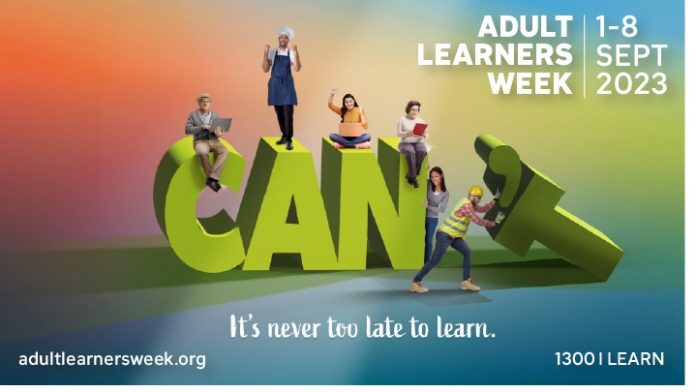Adult Learners Week – 1-8 September 2023
Despite struggling with schooling and being labelled by her teachers as below average academically, Deanie De Boer persisted in her learning journey. Her struggles all made sense when, in her early 40s she received a diagnosis of ADHD.
As a young adult, Deanie undertook a business administration course at her local TAFE and in 2010, she began studying Psychology. With a growing family – she now has five sons – it took her 10 years to graduate. Now aged 46, and with her own successful counselling business, Deanie is continuing her studies, this time working towards a Masters Degree in Counselling, an accomplishment she never imagined possible as a child.
Deanie is just one of many thousands of Australians whose lives have been transformed by adult education.
Inspiring others to return to learning
51-year-old Grahame Neville has worked in the same job in the laundry department at his local hospital for almost 30 years. It wasn’t that he lacked ambition. Grahame was unable to transition to a promoted role due to his poor literacy and numeracy skills.
In 2021 Grahame enrolled into an adult literacy course at his local college and went on to complete a Certificate II in Work and Vocational Pathways and Computing for Work. He is now continuing his studies, focussing on development and leadership. He has become a passionate advocate for adult education and literacy, appearing on the SBS series, Lost for Words in 2022 and winning the Community Colleges Australia Student of the Year award in the same year.
Sunil Abbott, aged 69, migrated to Australia from India in 2011 with the equivalent of a Year 12 education. He struggled to adapt and had little or no knowledge of computers and technology or how systems and services worked. He had never encountered an EFTPOS machine for example and had to go about learning basic skills that others take for granted.
Sunil now runs two busy restaurants, yet, despite his demanding work, he makes time for learning and has undertaken many courses at his local community education centre. Now a prominent leader in his community, he helped establish a local platform that promotes learning and social connections for older people. His commitment to lifelong learning has earned him numerous awards and positions on various councils and representative bodies. He says that he has learned more in the past 12 years here in Australia than in his entire time in India and he feels happy to be in an environment that encourages learning at any age.
Using new skills to support others
34-year-old Trudy Shan Walder left school at the beginning of Year 11. At the age of 29, as part of her recovery from domestic violence and significant injuries which will remain throughout her life, she enrolled into an Aged and Disability Care program in her local community college. Despite the obstacles she faced, Trudy pushed through to pursue learning and she earned the nickname, “Dr Trudy” for her fervour.
In 2019, Trudy undertook Foundation Studies and later enrolled in Psychology at the University of South Australia. She also learned to play the saxophone and joined a local band, with which she now performs. Trudy plans to finish her psychology course next year and hopes to work in education to support students pursuing their own learning goals.
Terrence Lennon-Wingfield, now 28, grew up in Ceduna, nearly 800 kilometres from Adelaide. He was often absent from school, due to illness and when he did attend, other kids made life difficult. He made it to high school but dropped out because he lacked the basic skills needed for reading and writing.
Terrence found odd jobs in-between stretches of unemployment but his literacy skills held him back. Reading text messages, filling out job applications or dealing with everyday paperwork was a struggle. In 2020, tired of relying on others to do his reading for him, he enrolled in a course at his local Aboriginal College to improve his literacy and numeracy and discovered a taste for learning. With a new sense of empowerment, he completed basic infection control training and became a volunteer Covid19 Marshall during the height of the pandemic.
Last year, Terrence enrolled in the University of Adelaide’s Preparatory Program, with his sights set on higher education. He is now doing theological studies in Sydney and following his passion for supporting his community by working as a youth pastor at the Living Water Community Church in Redfern.
Belinda Flavel, now 42 years old and a single mum to her 6 year old daughter started university at the age of 35. She didn’t finish year 10, because a horse riding accident left her in a coma for 2 weeks and with short term memory loss and loss of movement which required many months of rehabilitation.
Following her recovery, Belinda started working in retail, then as a bookkeeper. During this time she struggled with her mental health, depression and alcoholism. She eventually completed certificates at TAFE in bookkeeping, OHS and computing and at the age of 31, discovered her passion for helping people. She then went on to complete a Diploma of Community Services and from there, she nervously stepped into university.
It took Belinda almost 8 years to complete her Social Work degree, as she continued to raise her daughter and conquer the challenges of alcoholism (including spending 8 months in rehab). She then returned to study, displaying immense determination and strength. Since she graduated as a social worker, Belinda has followed her passion for mental health and addiction support and established a counselling practice that combines equine assisted therapy and play therapy for people of all ages.
Millions of Australians struggle with basic literacy and numeracy skills
It’s estimated that around 44% of Australians don’t have the literacy skills needed to successfully navigate everyday life, i.e., tasks like reading food and medicine labels, filling in bank forms, applying for a driver’s licence and signing rental agreements. The last comprehensive study of literacy in Australia, conducted by the OECD in 2012 put the low literacy level figure at 3 million people, but no up-to-date data currently exists.
President of Adult Learning Australia, Kathleen Priestly says, “People with low literacy and numeracy skills can struggle with essential tasks that the rest of us take for granted and they are also likely to feel high levels of shame and powerlessness, which can lead to social isolation. We are encouraging people who might have given up on learning for any reason at all to have another go, no matter their background, previous education level and age. The rewards can be profound.”
Adult Learners Week, which runs from 1 – 8 September is a UNESCO initiative supported in Australia by the Commonwealth Government and run each year by Adult Learning Australia, the national peak body for adult and community education.
This year’s theme — It’s Never Too Late — is a reminder that returning to learning at any age and stage can make a profound difference to one’s life. See more here.
Hundreds of events and activities are held around Australia at adult learning centres and online to promote the benefits of adult education and lifelong learning. Learning centres include neighbourhood houses, community centres, libraries, local governments, Aboriginal learning cooperatives, employers, not-for-profit organisations, workplaces, men’s sheds, U3As, community colleges, TAFE colleges and universities.
Regardless of your previous education level, re-engaging with learning can offer life-changing opportunities, from the thrill of discovering hidden talents and the satisfaction of learning new skills to the excitement of imagining and embarking on a new and different future.



































